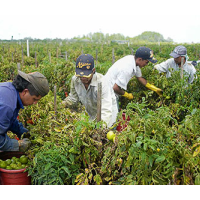California Running out of Workers Willing to Toil at Miserable Farm Jobs for Lousy Pay

California, the nation’s largest producer and exporter of agricultural products, is quickly running out of workers willing to work in the fields. More than 70% of agricultural producers expect to experience a worker shortage and some estimates have the labor force of 450,000 dropping by as much as 80,000.
The work is back-breaking; the pay is horrible; the working conditions are miserable; and the prospect of advancing through the ranks to a better position is practically non-existent. Yet, the debate about finding a solution is rarely about how to improve any of these factors.
John Carney at CNBC calls it the “campaign to avoid paying farm laborers market wages.” A report in the Sacramento Bee by Peter Hecht lays the blame for a graying work force, mostly made up of Mexican immigrants who never went home, on tighter border security, cartel violence near border crossings and economic recovery in Mexico.
The American Farm Bureau Federation estimates that between $5 billion and $9 billion is lost annually because of farmworker shortages. About 70% of all farmworkers in the state are believed to be illegal immigrants.
The solutions proffered include: more mechanization and switching to crops that can make use of it; new laws to encourage seasonal guest-workers; and offering a path to citizenship based on workers signing a multi-year employment contract.
J. Edward Taylor and Diane Charlton, blogging at Oxford University Press, suggest that none of these proposals will work because the problem isn’t a labor shortage―not with unemployment still well above 7%. “In order to induce domestic workers to supply their labor to farm jobs, agricultural wages must rise apace with nonagricultural wages.”
This is especially true, they say, since the farm jobs are “drudgery” compared to their non-farm competition. This was all borne out during the past five years of economic stagnation, when farm labor actually migrated to non-farm jobs.
As the growing season approaches and farm labor problems become more acute, growers may be left with only a few choices that they haven’t already tried―like a living wage and decent working conditions.
-Ken Broder
To Learn More:
As California Farmworkers Age, a Labor Shortage Looms (by Peter Hecht, Sacramento Bee)
What's Really Behind the Decline in Mexican Farm Workers? (by John Carney, CNBC)
Why Are Mexicans Leaving Farm Work, and What Does this Mean for US Farmers? (by J. Edward Taylor and Diane Charlton, Oxford University Press blog)
Farmers Feel the Pinch of Dwindling Migrant Labor (by Noel Brinkerhoff, AllGov)
- Top Stories
- Unusual News
- Where is the Money Going?
- Controversies
- U.S. and the World
- Appointments and Resignations
- Latest News
- Trump Offers to Return Alaska to Russia
- Musk and Trump Fire Members of Congress
- Trump Calls for Violent Street Demonstrations Against Himself
- Trump Changes Name of Republican Party
- The 2024 Election By the Numbers






Comments